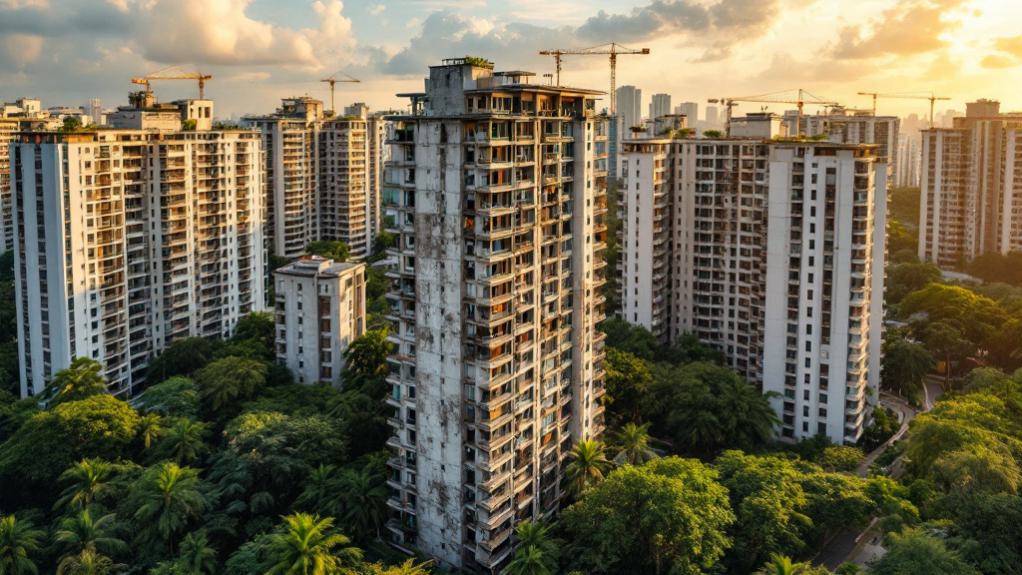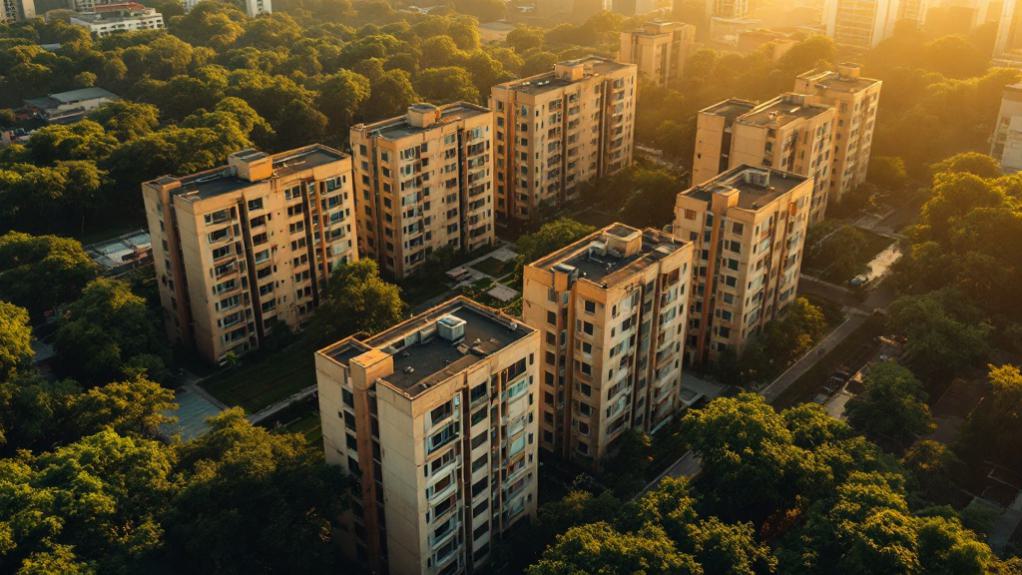An en bloc sale entails the collective ownership transfer of an entire property to a single purchaser, usually developers, as stipulated under the Land Titles (Strata) Act. This process mandates 80-90% resident approval based on building age, involving a Collective Sale Committee, legal experts, and property advisors. Reserve prices target enhancements beyond individual property valuations, while the Strata Titles Board mediates conflicts and authorizes transactions. Comprehending apportionment methods and market dynamics can considerably influence transaction success.

Amidst the rapidly evolving landscape of property development in Singapore, en bloc and collective sales represent a profound mechanism for urban renewal and wealth creation. This process involves the collective sale of an entire property development to a single buyer, typically a developer, with the potential to generate substantial premiums over individual unit market values. Primarily applicable to private residential and select commercial properties, these transactions are governed by the Land Titles (Strata) Act, which establishes the regulatory framework for such sales.
The legal requirements for en bloc sales are stringent, necessitating consent from 80% of owners for properties older than 10 years and 90% for newer developments. The procedural framework commences with the formation of a pro-tempore committee, followed by the appointment of a Collective Sale Committee (CSC) through a general meeting of property owners. Subsequently, professionals including lawyers, valuers, and property consultants are engaged to navigate the complex legal and financial aspects of the transaction.
Financial considerations form the cornerstone of collective sales, with the reserve price established collaboratively by the CSC and property consultants. The apportionment methodology for sales proceeds must be equitable and transparent, considering factors such as unit size, floor level, and orientation. While the potential for windfall profits exists, owners must also account for associated costs including legal fees, valuation fees, and marketing expenses.
Market dynamics profoundly influence en bloc activity, with property cycles, government cooling measures, and land scarcity in Singapore acting as key determinants. Historical trends, such as the en bloc fever of 2017-2018, demonstrate the cyclical nature of this market segment. For developers, these acquisitions represent opportunities to replenish land banks and capitalize on future development potential.
Despite the financial advantages, collective sales present challenges including the forced relocation of dissenting minority owners and the emotional stress associated with displacement. The balance between individual property rights and collective economic benefits remains a persistent consideration in Singapore’s approach to urban redevelopment through en bloc sales.
Frequently Asked Questions
What Happens if I Oppose an En Bloc Sale?
Opposing an en bloc sale entitles the minority owner to file objections with the Strata Titles Board on grounds of financial loss, lack of good faith, or procedural irregularities.
The Board mediates disputes between parties, with unresolved matters proceeding to the High Court for final determination.
Objectors risk bearing legal costs if unsuccessful, may face strained neighbor relations, and could encounter difficulties selling individually while contending with ongoing maintenance expenses for aging properties.
Can Commercial Properties Undergo Collective Sales?
Commercial properties can indeed undergo collective sales, subject to the same statutory framework as residential en bloc sales under the Land Titles (Strata) Act.
These transactions require 80% consent from owners for properties exceeding 10 years of age, or 90% for newer developments.
The process typically involves older commercial complexes, office buildings, retail spaces, and industrial properties, allowing stakeholders to tap substantial land value while creating opportunities for thorough redevelopment of aging commercial assets in prime locations.
How Are En Bloc Sale Proceeds Taxed?
En bloc sale proceeds taxation varies by property type and circumstances. Residential property sales are typically exempt from income tax, while commercial properties may be subject to income tax and 7% GST if the seller is GST-registered.
Taxes are determined case-by-case by the Inland Revenue Authority of Singapore, which considers factors like transaction frequency to assess whether the seller operates a property trading business.
Seller’s Stamp Duty applies to properties sold within three years of purchase, regardless of en bloc status.
Are Overseas Property Owners Eligible to Vote?
Based on the eligibility criteria for overseas voters, Singaporean citizens who own overseas property are eligible to vote in Singapore elections if they meet specific requirements**: being at least 21 years old, having a registered Singapore address**, and having resided in Singapore for at least 30 days within the previous three years.
Non-citizen property owners, including permanent residents and foreign investors, are not granted voting rights regardless of their property ownership status.
Can the Government Block an En Bloc Sale?
The government can indeed block an en bloc sale through various regulatory mechanisms, primarily exercised by the Urban Redevelopment Authority.
Intervention may occur when proposals contravene the Master Plan zoning, fail to secure statutory consent thresholds, or present environmental concerns.
Additionally, authorities may halt proceedings for non-compliance with the Land Titles (Strata) Act, procedural irregularities, or if the development contradicts public interest considerations related to housing supply, infrastructure capacity, or national security imperatives.





